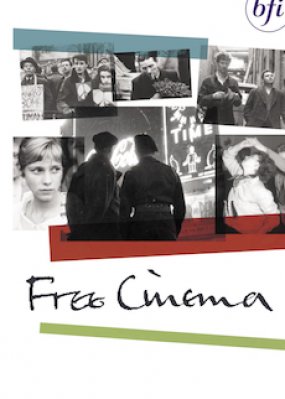
The BFI has compiled the definitive collection of films from the 1950s’ Free Cinema movement. Free Cinema not only reinvented British documentary making, but this highly influential period in the country’s cinema history was the precursor for the better known British New Wave of social realist films in the late 1950s and early 1960s.
The term Free Cinema was coined by critic and filmmaker Lindsay Anderson (If…., O Lucky Man!), when he, Karel Reisz ( Saturday Night and Sunday Morning ), Tony Richardson (A Taste of Honey, The Loneliness of the Long Distance Runner ) and Lorenza Mazzetti screened a programme of their short films at the National Film Theatre on 5 February 1956.
“Every beard and duffle coat in London, every urchin-cut and pair of jeans seemed to converge on the National Film Theatre on South Bank last night. Queues of cinema enthusiasts, even longer than during the Festival of Britain, stood in the drizzle for hours in the hope of seeing three short films [that] in four days have become the talk of the town,” reported the Evening News.
The screening was so successful that five more programmes followed until 1959, featuring films by both young British and foreign filmmakers.
The films were ‘free’ in the sense that they were made outside the framework of the film industry, and that their statements were entirely personal . They had in common not only the conditions of their production (shoestring budget, unpaid crew) and the equipment they employed (usually hand-held 16mm Bolex cameras), but also a style and attitude and an experimental approach to sound. Mostly funded by the BFI’s Experimental Film Fund, they featured ordinary, mostly working-class people at work and play, displaying a rare sympathy and respect, and a self-consciously poetic style. This collection contains:
- O Dreamland (Lindsay Anderson, UK, 1953, 12 min)
- Momma Don’t Allow (Karel Reisz/Tony Richardson, UK, 1956, 22 min)
- Together (Lorenza Mazzetti, UK, 1956, 52 min)
- Wakefield Express (Lindsay Anderson, UK, 1952, 30 min)
- Nice Time (Alain Tanner/Claude Goretta, UK, 1957, 17 min)
- The Singing Street (Norton Park Group/Nigel McIsaac, UK, 1952, 18 min)
- Everyday Except Christmas (Lindsay Anderson, UK, 1957, 40 min)
- Refuge England (Robert Vas, UK, 1959, 27 min)
- Enginemen (Michael Grigsby, UK, 1959, 21min)
- We Are the Lambeth Boys (Karel Reisz, UK, 1959, 52 min)
- Food for a Blush (Elizabeth Russell, UK, 1959, 30 min)
- One Potato Two Potato (Leslie Daiken, UK, 1957, 21 min)
- March to Aldermaston (anonymous, UK, 1959, 33 min)
- The Vanishing Street (Robert Vas, UK, 1962, 18 min)
- Tomorrow’s Saturday (Michael Grigsby, UK, 1962, 18 min)
- Gala Day (John Irvin, UK, 1963, 26 min)
Special features
- Small Is Beautiful: The story of the Free Cinema films told by their makers (2006), an exclusive 43-minute film consisting of specially commissioned interviews with Free Cinema filmmakers Lorenza Mazzetti, Walter Lassally, Alain Tanner and Michael Grigsby; film extracts and previously unseen photographs.
- A specially curated collection of five rarely seen short films from the late 1950s and early 1960s, made in the spirit of the Free Cinema movement.
- 40-page, fully illustrated booklet including a general introduction; the original manifestoes, notes on each of the 16 films, plus a further reading list and web links.
Product information
-
-
Certificate
Exempt
-
Colour
Black/white
-
Sound
Sound
-
Running time
314mins
-
Subtitles
English for the hard-of-hearing
-
Original aspect ratio
1.33:1
-
DVD region
2 Europe (except Russia, Ukraine, and Belarus), Middle East, Egypt, Japan, South Africa, Swaziland, Lesotho, Greenland, French Overseas departments and territories
-
Catalogue number
BFIVD717
-







